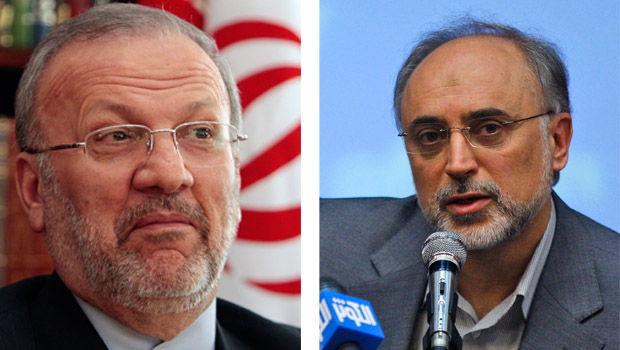The president thanked Manouchehr Mottaki for his more than five years of service — spanning Ahmadinejad's entire time in office — but gave no explanation for the change in a brief statement on his website. He named nuclear chief Ali Akbar Salehi, who is also one of the country's 12 vice presidents, to serve as caretaker foreign minister.
“This moves shows not only the internal tensions but the primacy of the nuclear issue as Iran's main foreign policy objective,” said Rasool Nafisi, an expert on Iranian affairs at Strayer University in Virginia.
In the past year, there were reports that Mottaki opposed a decision by Ahmadinejad to appoint his own special foreign envoys to key areas such as the Middle East, Afghanistan and the Caspian Sea region. Mottaki found the appointments embarrassing to the Foreign Ministry and allegedly took his complaint to Supreme Leader Ayatollah Ali Khamenei, who has the final say on all state matters.
Khamenei reportedly sided with Mottaki, forcing Ahmadinejad to moderate his position and change their title only to the level of advisers.
Iranian media have also reported in the past year that some lawmakers were pushing for Mottaki to be dismissed, arguing that he failed to adequately defend Iran at international organizations such as the United Nations.
It was not immediately clear how long Salehi would remain in the caretaker role. The semiofficial Fars news agency says Mohammad Ghannadi, a prominent nuclear scientist, is expected to replace Salehi as the new nuclear chief — an indication Ahmadinejad wants him to keep the job permanently. Ghannadi is currently Salehi's deputy at the Atomic Energy Organization of Iran.
Salehi — or any other candidate — has to win a vote of confidence from the 290-seat Parliament to be appointed to the job.
Meanwhile, Australia is at odds with its major security ally the United States over Iran, saying it is not a "rogue state" and its nuclear weapons program is for deterrence, not attack, according to US cables released by WikiLeaks.
The documents, published in the Sydney Morning Herald on Monday, also reveal that Australia's top security organization believes Tehran sees a "grand bargain" with the United States as its best way to ensure national security.
"It's a mistake to think of Iran as a 'rogue state'," then ONA chief Peter Varghese told the United States in a briefing, according to the 2008 US diplomatic cables from Canberra.
A US diplomatic cable from Canberra in 2008 said the ONA believed Tehran's desire to develop nuclear weapons was probably driven by a desire to deter Israel and the United States from attack rather than to launch a Middle East strike.
"ONA viewed Tehran's nuclear program within the paradigm of 'the laws of deterrence', noting that Iran's ability to produce a weapon may be 'enough' to meet its security objectives,” the US embassy reported to Washington.
"Nevertheless, Australian intelligence viewed Tehran's pursuit of full self-sufficiency in the nuclear fuel cycle, long-standing covert weapons program, and continued work on delivery systems as strong indicators that Tehran's preferred end state included a nuclear arsenal." The ONA believed "Iran's acquisition of nuclear weapons as inevitable" and the Australian government was concerned that such a move could see nuclear proliferation in Southeast Asia.










